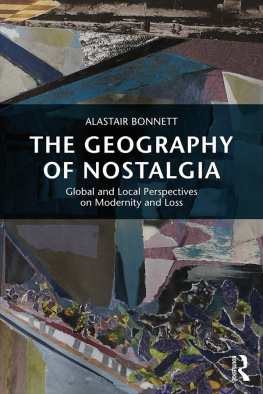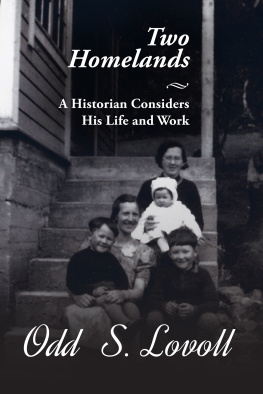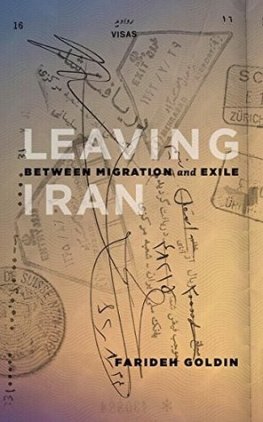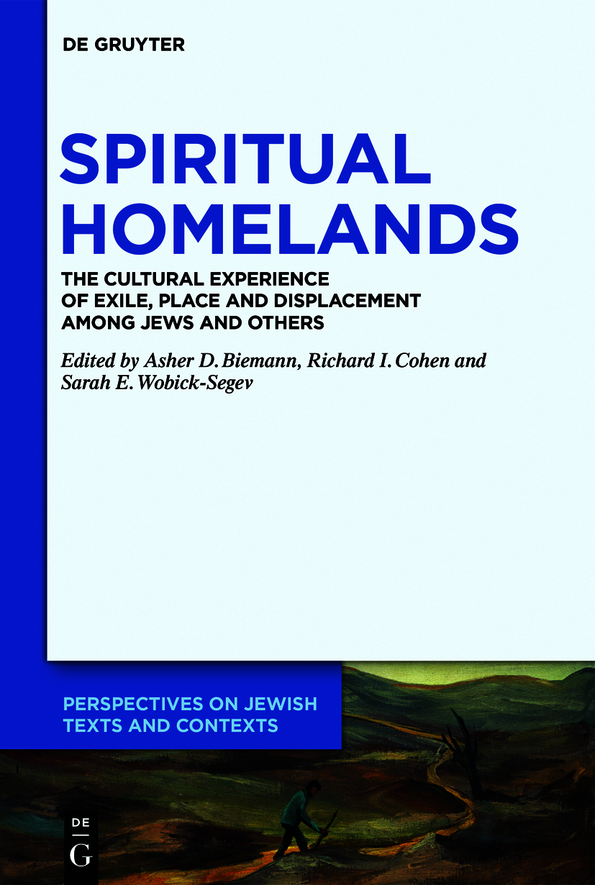Perspectives on Jewish Texts and Contexts
Edited by
Vivian Liska
Robert Alter
Steven E. Aschheim
Richard I. Cohen
Mark H. Gelber
Moshe Halbertal
Christine Hayes
Moshe Idel
Samuel Moyn
Ada Rapoport-Albert
Alvin Rosenfeld
David Ruderman
Bernd Witte
Volume
ISBN 9783110637366
e-ISBN (PDF) 9783110637564
e-ISBN (EPUB) 9783110637618
Bibliographic information published by the Deutsche Nationalbibliothek
The Deutsche Nationalbibliothek lists this publication in the Deutsche Nationalbibliografie; detailed bibliographic data are available on the Internet at http://dnb.dnb.de.
2019 Walter de Gruyter GmbH, Berlin/Boston
Introduction
Asher D. Biemann
Richard I. Cohen
Sarah E. Wobick-Segev
This volume of essays began by happenstance. An interdisciplinary center of excellence in Israel, Daat Hamakom, Center for the Study of Cultures of Place in Jewish Modernity, supported by the Israel Science Foundation, began its activities in 2012 with the goal to further academic cooperation and intellectual pursuit with colleagues and centers in Israel and abroad. By chance, as things often happen in the academic world, colleagues at the University of Virginia, and in particular Professor Asher Biemann, were in the throes of thinking of expanding their scholarly interests and horizons in issues of Homeland, Exile, Imagined Homelands and the like, and were involved in discussions on creating a conference on these themes. Our interests coincided and thus we embarked on a joint venture that began with an international conference in Charlottesville, Virginia in 2015 and a sequel workshop with some of the original participants in Yad Hashmona, Israel in 2017. Fortunately, Dr. Sarah Wobick-Segev, a historian of modern Jewish history, who joined us on the eve of the workshop in Israel and has been a wonderful collaborator from that point on, has taken on many responsibilities for the editorial process, not the least of which was her active participation in the composition of this introduction.
Colleagues from both centers and participants have been acutely aware that these themes relating to place touch dramatically on contemporary society in which hundreds of thousands of refugees are leaving their homes for a host of reasons and seek a new homeland, often at high risk to their lives. Interestingly, the papers collected here make no allusions to the plight of these people, but their analyses of literary and historical phenomena offer insight to the burden of our times. This volume brings together mutual contemplations of both venues.
Place and the multiple expressions Jews developed for a particular place was an overriding theme of Daat Hamakom. The term makom, in Hebrew , carries innumerable meanings and associations geographic, theological (for example, God is referred to as Makom), philosophical, and existential. Indeed, the presence of place has permeated Jewish life and consciousness from time immemorial but has taken dramatic turns in modern times. Place in this context is a feature of modern cultural adaptation that relates to the cultural dilemmas of loss, nostalgia, utopia, travel, longing, but also in terms of boundaries, languages, and space, and the cultural dilemmas associated with being misplaced and displaced as well as re-placed.
The geography of culture can be viewed as a means of mapping where and how certain modes of creativity and their traditions became rooted, or in many cases when and how they became uprooted and were then transported to new contexts and transformed. The turn to spatial and geographic concerns in the
study of the humanities can be fruitfully and imaginatively applied to the Jewish case and that, in turn, can enrich scholarly discourse from this particular angle of vision. The idea of place anchors this volume in a field of research related to the overall question: how do realia of particular places influence behavior, consciousness, beliefs, and creativity?
Spiritual Homelands poses these questions anew from a variety of disciplinary approaches, including history, literary criticism, ethnography, and cultural studies. It is an exploration into a world of boundary crossings and of desired places and alternate identities, into a world of adopted kin and invented allegiances. What makes this theme relevant is that the election of a homeland is no mere fantasy and projection of the mind, but a transformative and mutually constitutive process. Scholars such as Arjun Appadurai and Homi Bhabha have recently created theoretical frameworks for communities of sentiment and narrative identities co-existing with larger transnational realities. Others, such as Barbara Kirshenblatt-Gimblett, have reconsidered the fixity of locations as accidents of proximity and the old dichotomies of here and there, home and exile, as spaces of dispersal. Spiritual homelands are fixed
points in a fluctuating, accidental geography. But their elective topography is also an acknowledgment of the transience of human space and the uncertainty of belonging. Spiritual homelands at once seek places and betray a sense of placelessness. They are, paradoxically, homecomings into an elsewhere. And as such, they frequently function as forms of cultural critique and statements of dissent and protestation, though they can also become sites of disguise and hiding.
Not all election of place, of course, is one of free agency and conscious choice. More often than not, spiritual homelands emerge from conditions imposed by power and force. They belong to complex stories of migration and exile, which, in one form or another, have always been part of human history despite claims to the contrary made by waves of nativist movements throughout the modern era.
Though the various terms to explain the loss of home change from language to language and over time, there appears to be a fundamental commonality to the visceral nature of this experience.
By the early twentieth century, as old homelands disintegrated and were replaced with new states, many people lost their footing, along with their previous political affiliation. Looking for mooring, some tried to find solace in new conceptualizations of cosmopolitanism, which they saw as the antithesis of the rabid nationalism that surrounded them. The famous Austrian-Jewish author Stefan Zweig, for example, would write a number of biographies on historical figures whom he understood as serving as guiding lights in dark times. Zweigs work on Erasmus pitted the humanist against Luther and was, as such, a parable on the dangers of nationalism and fanaticism. Erasmus, in Zweigs reading, was
The refugee crises of the twentieth century in general and the Holocaust in particular have become paradigmatic case studies for philosophers and political ethicists. Carens has argued that the Holocaust is the watershed moment that proves the states responsibility to welcome those in critical need.
More recently Jacques Derrida has returned to Kants concept of cosmopolitanism and advocated with others for cities of refuge. Yet much of this Kantian-inflected discussion of the ethics of cosmopolitanism is top-down,
focused on the responsibilities of the state (or city) toward those who seek its hospitality. What of the exiles themselves? For as much as cosmopolitanism seemed to offer a way out for some in the face of exile or nationalism or religious particularism, the need for belonging and a concrete place to call home has remained pressing, even for the most committed humanists and cosmopolitans.










